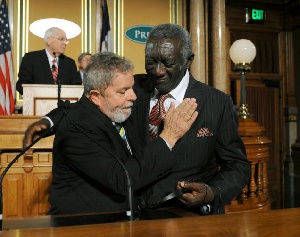- Home - News
- TWI News | TV
- Polls
- Year In Review
- News Archive
- Crime & Punishment
- Politics
- Regional
- Editorial
- Health
- Ghanaians Abroad
- Tabloid
- Africa
- Religion
- Election 2020
- Coronavirus
- News Videos | TV
- Photo Archives
- News Headlines
- Press Release
General News of Sunday, 16 October 2011
Source: The Hindu
Kufuor recognised for eradicating chronic hunger
Even as the world’s poor continue to suffer daily under added pressure from the global economic downturn, this week two former Presidents were awarded the 2011 World Food Prize for their success in tackling chronic hunger in their countries.
In an elegant ceremony at the State Capitol in Des Moines, Iowa, on Thursday, John Agyekum Kufuor, former President of Ghana, and Luiz Inácio Lula da Silva, former President of Brazil, were honoured for creating and implementing government policies that alleviated hunger and transformed the lives of the poor.
The award, which was instituted in 1987 by Nobel Peace Prize winner and father of the Green Revolution Norman Borlaug, has in the past been given to agricultural scientists such as M.S. Swaminathan of India – the winner of the first ever WFP award. It has also sometimes gone to social entrepreneurs such as Muhammad Yunus of the Grameen Bank, Bangladesh.
However on this occasion, the WFP Foundation chose to highlight the importance of political commitment to reducing chronic hunger, personified in leaders such as Mr. Lula and Mr. Kufuor, who then went on to translate that commitment into policy action and results on the ground.
“These achievements put Brazil and Ghana on track to meet or exceed the objectives of the United Nations Millennium Development Goals, making the two leaders model examples in realising an end to hunger and poverty worldwide,” the WFP Foundation said in a statement, giving further details about each leader’s unique contributions.
Mr. Kufuor, who was the President of Ghana for two terms during 2001-2009, implemented major economic and educational policies that increased the quality and quantity of food to Ghanaians, enhanced farmers’ incomes, and improved school attendance and child nutrition through a nationwide feeding program.
The WFP noted that under Mr. Kufuor’s leadership, Ghana became the first sub-Saharan African country to cut in half the proportion of its people who suffer from hunger and the proportion of people living on less than a dollar per day, and he prioritised national agricultural policies.
Mr. da Silva, who rose to the nation’s top public office despite being born into a poor family, had announced his intention to make fighting hunger and poverty a top priority of his government even before assuming office as President in 2003. As President, Mr. da Silva ensured that more than ten government ministries were focused on the expansive Zero Hunger programmes, “which provided greater access to food, strengthened family farms and rural incomes, increased enrolment of primary school children, and empowered the poor.”
Similar to the policies of Mr. Kufuor, Mr. da Silva’s approach showed the dramatic transformation that the highest-level political commitments could bring about. During his time in office, the Millennium Development Goal on hunger eradication was exceeded as Brazil cut in half proportion of its people who were in hunger.
In earlier comments to The Hindu, Professor Swaminathan had said that the experiences in Brazil and Ghana could be compared to the situation of India, where sharp food price fluctuations have occurred in recent years with the poor feeling the brunt of food shortages despite government silos being well-stocked.
He argued that rampant under-nutrition and malnutrition in India showed that more income for farmers was required, saying, “Agriculture will have to be revitalised in terms of getting more per drop of water or per unit of land — in other words this can only be achieved by technological [upgrades] and more attention to land- and resource-use planning.”
The WFP award presentation to Mr. da Silva and Mr. Kufuor coincided with the Borlaug Dialogue international symposium, themed “The Next Generation: Confronting the Hunger Challenges of Tomorrow”.











